Iyanuoluwa Shode
Understanding and Mitigating Risks of Generative AI in Financial Services
Apr 25, 2025Abstract:To responsibly develop Generative AI (GenAI) products, it is critical to define the scope of acceptable inputs and outputs. What constitutes a "safe" response is an actively debated question. Academic work puts an outsized focus on evaluating models by themselves for general purpose aspects such as toxicity, bias, and fairness, especially in conversational applications being used by a broad audience. In contrast, less focus is put on considering sociotechnical systems in specialized domains. Yet, those specialized systems can be subject to extensive and well-understood legal and regulatory scrutiny. These product-specific considerations need to be set in industry-specific laws, regulations, and corporate governance requirements. In this paper, we aim to highlight AI content safety considerations specific to the financial services domain and outline an associated AI content risk taxonomy. We compare this taxonomy to existing work in this space and discuss implications of risk category violations on various stakeholders. We evaluate how existing open-source technical guardrail solutions cover this taxonomy by assessing them on data collected via red-teaming activities. Our results demonstrate that these guardrails fail to detect most of the content risks we discuss.
Which Nigerian-Pidgin does Generative AI speak?: Issues about Representativeness and Bias for Multilingual and Low Resource Languages
Apr 30, 2024Abstract:Naija is the Nigerian-Pidgin spoken by approx. 120M speakers in Nigeria and it is a mixed language (e.g., English, Portuguese and Indigenous languages). Although it has mainly been a spoken language until recently, there are currently two written genres (BBC and Wikipedia) in Naija. Through statistical analyses and Machine Translation experiments, we prove that these two genres do not represent each other (i.e., there are linguistic differences in word order and vocabulary) and Generative AI operates only based on Naija written in the BBC genre. In other words, Naija written in Wikipedia genre is not represented in Generative AI.
MEDs for PETs: Multilingual Euphemism Disambiguation for Potentially Euphemistic Terms
Jan 25, 2024
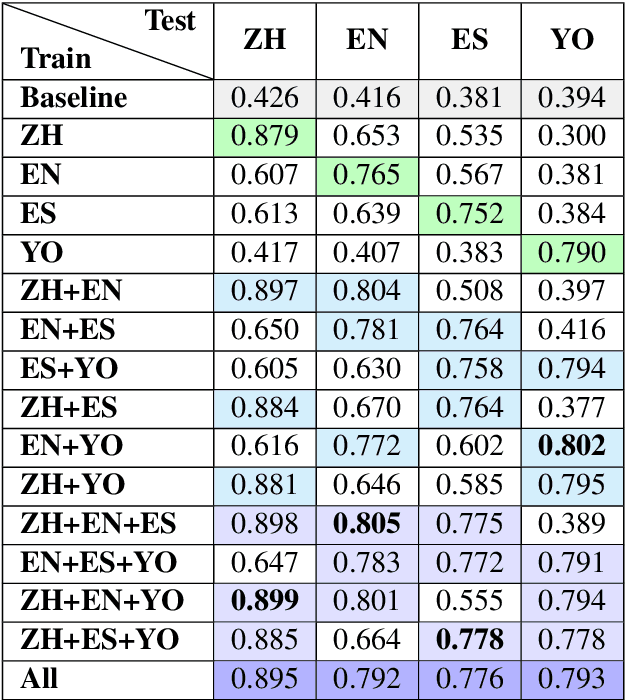

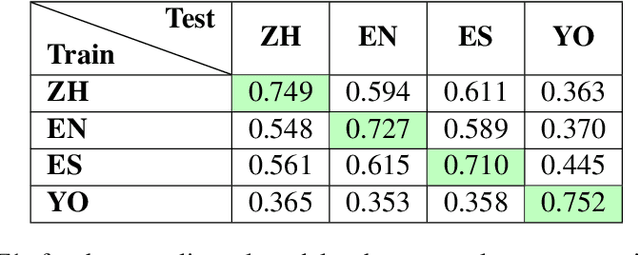
Abstract:This study investigates the computational processing of euphemisms, a universal linguistic phenomenon, across multiple languages. We train a multilingual transformer model (XLM-RoBERTa) to disambiguate potentially euphemistic terms (PETs) in multilingual and cross-lingual settings. In line with current trends, we demonstrate that zero-shot learning across languages takes place. We also show cases where multilingual models perform better on the task compared to monolingual models by a statistically significant margin, indicating that multilingual data presents additional opportunities for models to learn about cross-lingual, computational properties of euphemisms. In a follow-up analysis, we focus on universal euphemistic "categories" such as death and bodily functions among others. We test to see whether cross-lingual data of the same domain is more important than within-language data of other domains to further understand the nature of the cross-lingual transfer.
AfriMTE and AfriCOMET: Empowering COMET to Embrace Under-resourced African Languages
Nov 16, 2023
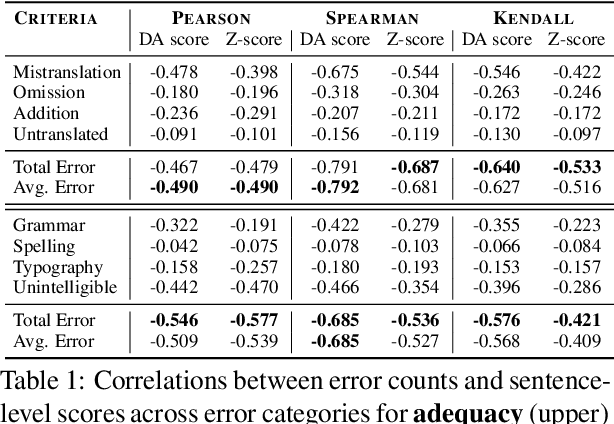
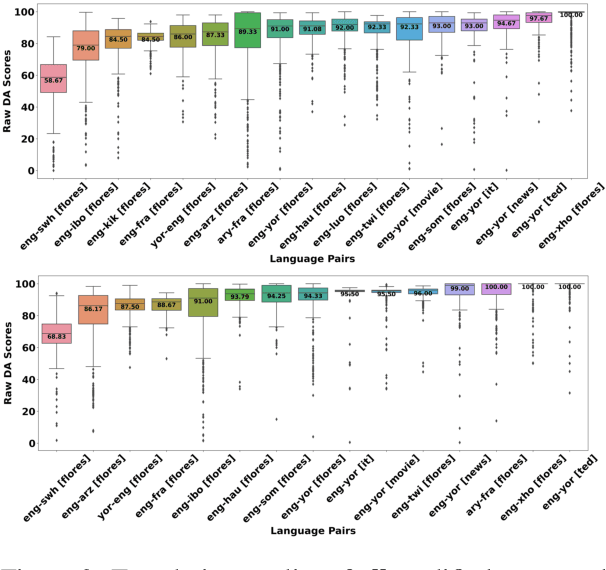
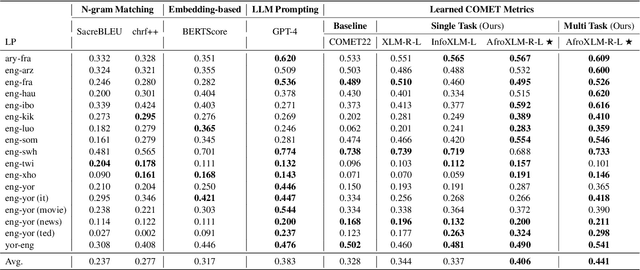
Abstract:Despite the progress we have recorded in scaling multilingual machine translation (MT) models and evaluation data to several under-resourced African languages, it is difficult to measure accurately the progress we have made on these languages because evaluation is often performed on n-gram matching metrics like BLEU that often have worse correlation with human judgments. Embedding-based metrics such as COMET correlate better; however, lack of evaluation data with human ratings for under-resourced languages, complexity of annotation guidelines like Multidimensional Quality Metrics (MQM), and limited language coverage of multilingual encoders have hampered their applicability to African languages. In this paper, we address these challenges by creating high-quality human evaluation data with a simplified MQM guideline for error-span annotation and direct assessment (DA) scoring for 13 typologically diverse African languages. Furthermore, we develop AfriCOMET, a COMET evaluation metric for African languages by leveraging DA training data from high-resource languages and African-centric multilingual encoder (AfroXLM-Roberta) to create the state-of-the-art evaluation metric for African languages MT with respect to Spearman-rank correlation with human judgments (+0.406).
FEED PETs: Further Experimentation and Expansion on the Disambiguation of Potentially Euphemistic Terms
Jun 06, 2023



Abstract:Transformers have been shown to work well for the task of English euphemism disambiguation, in which a potentially euphemistic term (PET) is classified as euphemistic or non-euphemistic in a particular context. In this study, we expand on the task in two ways. First, we annotate PETs for vagueness, a linguistic property associated with euphemisms, and find that transformers are generally better at classifying vague PETs, suggesting linguistic differences in the data that impact performance. Second, we present novel euphemism corpora in three different languages: Yoruba, Spanish, and Mandarin Chinese. We perform euphemism disambiguation experiments in each language using multilingual transformer models mBERT and XLM-RoBERTa, establishing preliminary results from which to launch future work.
NollySenti: Leveraging Transfer Learning and Machine Translation for Nigerian Movie Sentiment Classification
May 18, 2023



Abstract:Africa has over 2000 indigenous languages but they are under-represented in NLP research due to lack of datasets. In recent years, there have been progress in developing labeled corpora for African languages. However, they are often available in a single domain and may not generalize to other domains. In this paper, we focus on the task of sentiment classification for cross domain adaptation. We create a new dataset, NollySenti - based on the Nollywood movie reviews for five languages widely spoken in Nigeria (English, Hausa, Igbo, Nigerian-Pidgin, and Yoruba. We provide an extensive empirical evaluation using classical machine learning methods and pre-trained language models. Leveraging transfer learning, we compare the performance of cross-domain adaptation from Twitter domain, and cross-lingual adaptation from English language. Our evaluation shows that transfer from English in the same target domain leads to more than 5% improvement in accuracy compared to transfer from Twitter in the same language. To further mitigate the domain difference, we leverage machine translation (MT) from English to other Nigerian languages, which leads to a further improvement of 7% over cross-lingual evaluation. While MT to low-resource languages are often of low quality, through human evaluation, we show that most of the translated sentences preserve the sentiment of the original English reviews.
AfriQA: Cross-lingual Open-Retrieval Question Answering for African Languages
May 11, 2023



Abstract:African languages have far less in-language content available digitally, making it challenging for question answering systems to satisfy the information needs of users. Cross-lingual open-retrieval question answering (XOR QA) systems -- those that retrieve answer content from other languages while serving people in their native language -- offer a means of filling this gap. To this end, we create AfriQA, the first cross-lingual QA dataset with a focus on African languages. AfriQA includes 12,000+ XOR QA examples across 10 African languages. While previous datasets have focused primarily on languages where cross-lingual QA augments coverage from the target language, AfriQA focuses on languages where cross-lingual answer content is the only high-coverage source of answer content. Because of this, we argue that African languages are one of the most important and realistic use cases for XOR QA. Our experiments demonstrate the poor performance of automatic translation and multilingual retrieval methods. Overall, AfriQA proves challenging for state-of-the-art QA models. We hope that the dataset enables the development of more equitable QA technology.
MasakhaNEWS: News Topic Classification for African languages
Apr 19, 2023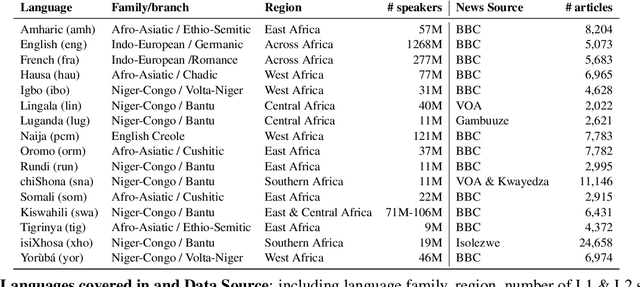
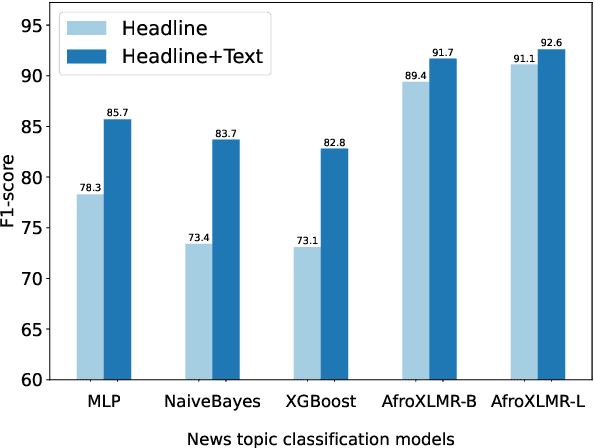
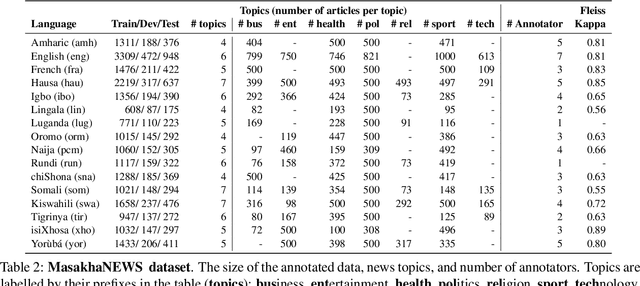
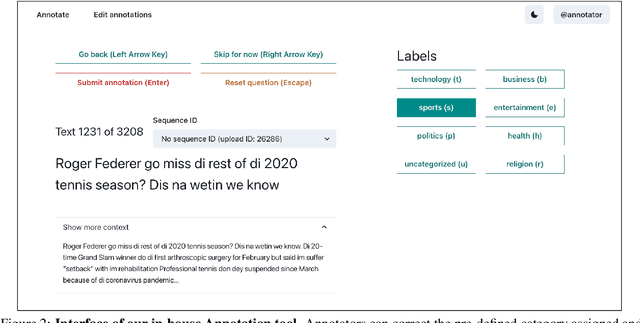
Abstract:African languages are severely under-represented in NLP research due to lack of datasets covering several NLP tasks. While there are individual language specific datasets that are being expanded to different tasks, only a handful of NLP tasks (e.g. named entity recognition and machine translation) have standardized benchmark datasets covering several geographical and typologically-diverse African languages. In this paper, we develop MasakhaNEWS -- a new benchmark dataset for news topic classification covering 16 languages widely spoken in Africa. We provide an evaluation of baseline models by training classical machine learning models and fine-tuning several language models. Furthermore, we explore several alternatives to full fine-tuning of language models that are better suited for zero-shot and few-shot learning such as cross-lingual parameter-efficient fine-tuning (like MAD-X), pattern exploiting training (PET), prompting language models (like ChatGPT), and prompt-free sentence transformer fine-tuning (SetFit and Cohere Embedding API). Our evaluation in zero-shot setting shows the potential of prompting ChatGPT for news topic classification in low-resource African languages, achieving an average performance of 70 F1 points without leveraging additional supervision like MAD-X. In few-shot setting, we show that with as little as 10 examples per label, we achieved more than 90\% (i.e. 86.0 F1 points) of the performance of full supervised training (92.6 F1 points) leveraging the PET approach.
Masakhane-Afrisenti at SemEval-2023 Task 12: Sentiment Analysis using Afro-centric Language Models and Adapters for Low-resource African Languages
Apr 13, 2023



Abstract:AfriSenti-SemEval Shared Task 12 of SemEval-2023. The task aims to perform monolingual sentiment classification (sub-task A) for 12 African languages, multilingual sentiment classification (sub-task B), and zero-shot sentiment classification (task C). For sub-task A, we conducted experiments using classical machine learning classifiers, Afro-centric language models, and language-specific models. For task B, we fine-tuned multilingual pre-trained language models that support many of the languages in the task. For task C, we used we make use of a parameter-efficient Adapter approach that leverages monolingual texts in the target language for effective zero-shot transfer. Our findings suggest that using pre-trained Afro-centric language models improves performance for low-resource African languages. We also ran experiments using adapters for zero-shot tasks, and the results suggest that we can obtain promising results by using adapters with a limited amount of resources.
AfroLM: A Self-Active Learning-based Multilingual Pretrained Language Model for 23 African Languages
Nov 07, 2022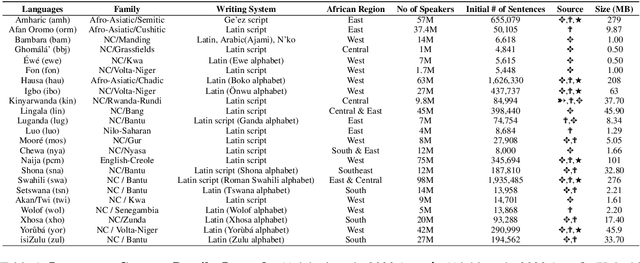
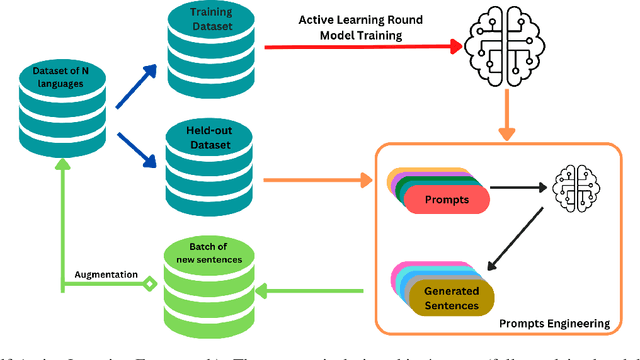
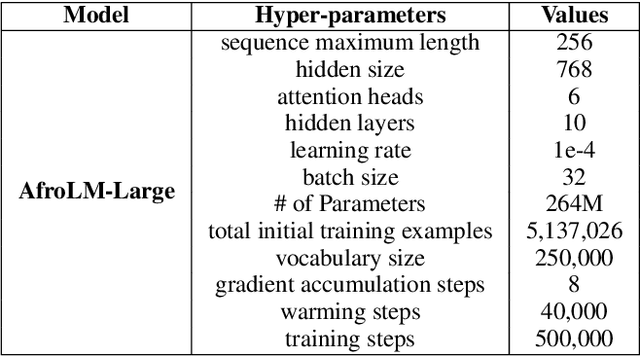
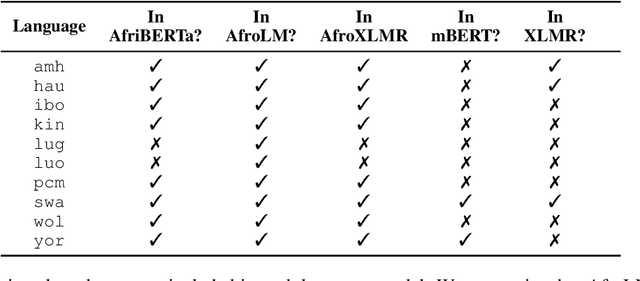
Abstract:In recent years, multilingual pre-trained language models have gained prominence due to their remarkable performance on numerous downstream Natural Language Processing tasks (NLP). However, pre-training these large multilingual language models requires a lot of training data, which is not available for African Languages. Active learning is a semi-supervised learning algorithm, in which a model consistently and dynamically learns to identify the most beneficial samples to train itself on, in order to achieve better optimization and performance on downstream tasks. Furthermore, active learning effectively and practically addresses real-world data scarcity. Despite all its benefits, active learning, in the context of NLP and especially multilingual language models pretraining, has received little consideration. In this paper, we present AfroLM, a multilingual language model pretrained from scratch on 23 African languages (the largest effort to date) using our novel self-active learning framework. Pretrained on a dataset significantly (14x) smaller than existing baselines, AfroLM outperforms many multilingual pretrained language models (AfriBERTa, XLMR-base, mBERT) on various NLP downstream tasks (NER, text classification, and sentiment analysis). Additional out-of-domain sentiment analysis experiments show that \textbf{AfroLM} is able to generalize well across various domains. We release the code source, and our datasets used in our framework at https://github.com/bonaventuredossou/MLM_AL.
 Add to Chrome
Add to Chrome Add to Firefox
Add to Firefox Add to Edge
Add to Edge